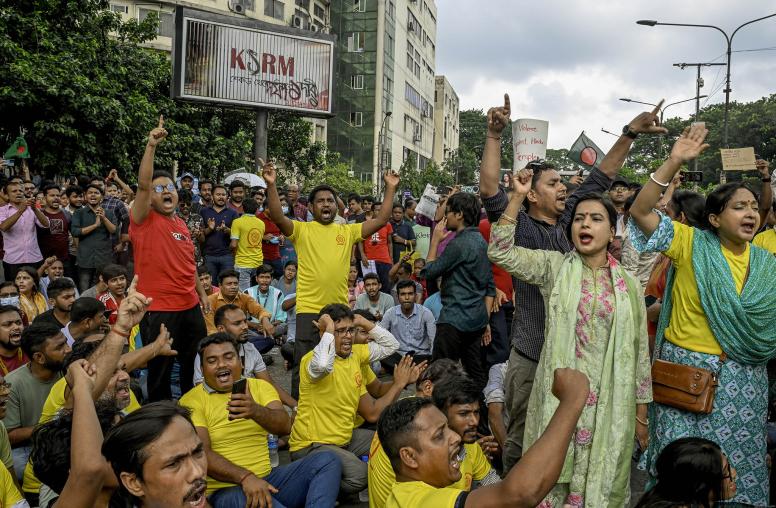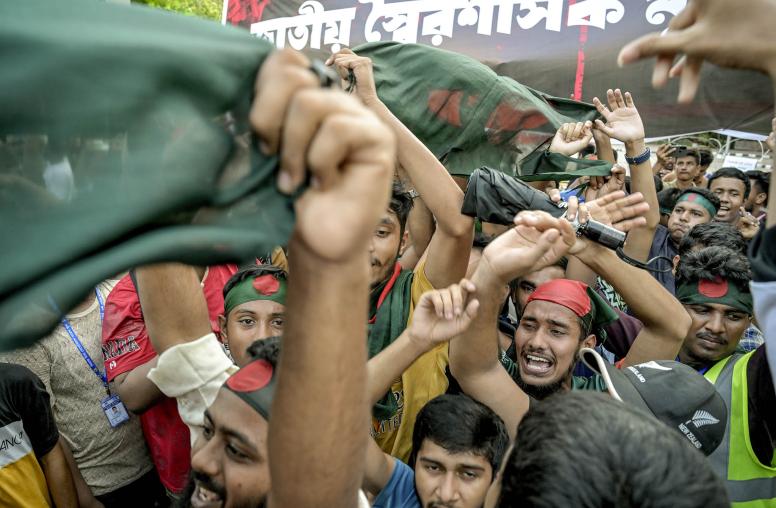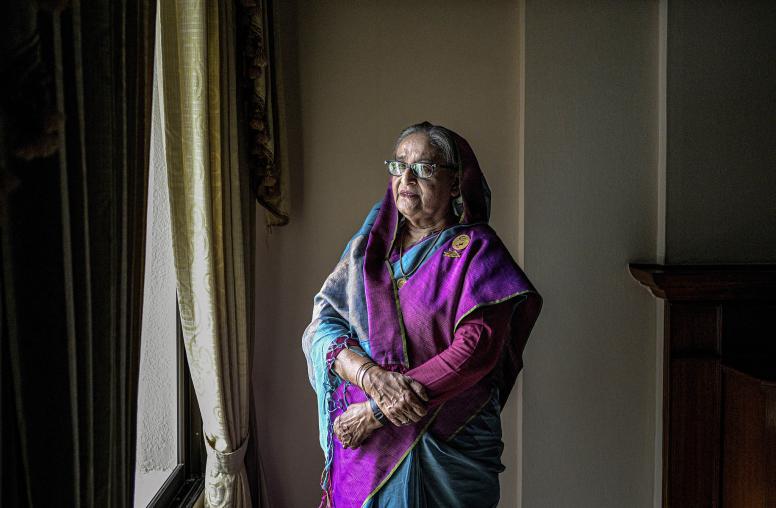The Rise of Islamist Militancy in Bangladesh
Governance, rule of law, and provision of justice are in short supply in Bangladesh. A campaign of terror, unleashed by Islamist militants in 1999, has gone virtually unchecked, threatening South Asian security. How should the U.S. respond to the situation in Bangladesh?

Summary
- Bangladesh has generally been heralded as a stable, democratic Muslim state that has made great strides in economic and human development. Following the restoration of democracy in 1990, it carried out three largely free and fair general elections in 1991, 1996, and 2001.
- Since 1999, attacks by Islamist militants have been increasing. They have targeted opposition politicians, scholars, journalists, members of the judiciary, religious minorities, and members of the Islamic Ahmadiyya sect.
- Recent years have seen a deepening crisis in governance with continued politicization of civil society, deterioration of judicial independence, and diminishing rule of law and respect for human rights.
- Until very recently, the ruling coalition of Prime Minister Khaleda Zia (backed by two Islamist parties) denied the existence of Islamist militancy in Bangladesh, dismissing these charges as "hostile propaganda," designed to besmirch the country's reputation. Following a countryside terrorist attack in August 2005 and recent suicide bombings, the government has begun cracking down on selected individuals.
- Indian observers and policymakers are concerned about the activities of Bangladeshi Islamists. They accuse Dhaka of exacerbating the ongoing insurgencies in India's Northeast by turning a blind eye to growing illegal immigration. They also contend that Bangladesh is cooperating with Pakistan to target India.
- In light of these developments, questions persist about the government's dedication to respond decisively to Islamist terrorism, conduct free and fair elections in 2007, and address the deterioration in the rule of law and respect for human rights.
- Because of Bangladesh's regional importance and the implications of internal security developments, the United States has limited policy options to promote its regional goals and ensure democratic elections.
Introduction
On November 29, 2005, some ten people, including two police officers, were killed in suicide bombings in the towns of Chittagong and Gazipur, Bangladesh. In the Gazipur incident, the suicide bomber, dressed as a lawyer, had entered the office of the local bar association. These two attacks came as part of a spate of bombings in November that had cost the lives of two lower court judges and two court employees. The previous attacks, it is widely believed, were the work of the recently banned Jamaat-ul-Mujahideen (JUM), a pro-Taliban, Wahabi-oriented organization.
The attacks on the judiciary were the apogee of a series of lethal assaults that have taken place in Bangladesh in the past several years. Almost all can be traced to a range of Islamist organizations that have been operating with impunity. For example, Islamist militants are alleged to be responsible for the February 2005 assassination of S.A.M.S. Kibria, a former foreign secretary and foreign minister. They also were implicated in the death of a prominent opposition politician, Ivy Rehman, and an aborted attempt in August 2004 on the life of Sheikh Hasina Wajed, the parliamentary opposition leader.
In the past several years, Islamist militancy in Bangladesh and tensions with India have attracted the attention of journalists, scholars, and some policymakers in the United States and elsewhere. The ruling coalition (backed by two Islamist parties, the Jamaat-i-Islami and the Islamic Oikye Jote) of Prime Minister Khaleda Zia has vigorously denied that Islamist militancy in Bangladesh is on the rise. Instead it has dismissed these charges as "hostile propaganda," designed to besmirch Bangladesh's reputation as a moderate Islamic state.
Substantial numbers of Indian observers and policymakers have taken a markedly different position. With equal vigor they have sounded the alarm about the activities of radical Islamists in Bangladesh. They also have accused Bangladesh of exacerbating tensions in India's Northeast by turning a blind eye to growing illegal immigration into India and by cooperating with Pakistan's Inter-Services Intelligence Directorate (ISI-D) in nefarious designs against India.
Bangladesh, which lacked a tradition of militant Islamism, has indeed moved in that direction in recent years, as Eliza Griswold showed in her New York Times Magazine article (January 23, 2005). The rise of Islamist militant groups in Bangladesh and their possible ties to Pakistan should be of concern to U.S. policymakers. Given the weak governance and lack of political order in Bangladesh, the increase in Islamist militancy could easily turn it into a fertile area for various radical groups to take root and flourish. On the regional level, the emergence of such groups could worsen already strained relations with India. They also could adversely affect U.S. security interests if Islamist insurgents from Southeast Asia and the Middle East come to see Bangladesh as a possible haven, especially as they face U.S. pressure in Pakistan and Afghanistan.
India, too, has concerns about the involvement of Bangladesh in its troubles in the Northeast, which could create an opportunity for Pakistani involvement. The empirical basis for this assertion is limited and partial: Unequivocal evidence of Pakistani involvement is hard to establish, and most of the assertions about Pakistani involvement come from Indian sources. However, given the increasing cooperation between Washington and New Delhi on issues of counterterrorism and intelligence, the United States should take these claims seriously.
Conclusion and Recommendations
The U.S. Embassy in Bangladesh identifies several areas of concern, including the prevention of and response to terrorism, development of democratic systems, and respect for American values. But the United States has yet to develop sophisticated and effective means to promote its goals in Bangladesh—a serious problem that needs immediate attention. What are some ways the United States could promote its varied goals in the country?
Judicious Use of "Public Shaming" Still Works. As one of Bangladesh's principal aid donors, the United States is in a position to exert considerable pressure on the current government in Dhaka. This form of pressure is likely to work even though Bangladesh, in a technical sense, no longer depends upon foreign aid. However, the government of Bangladesh sees the flow of foreign assistance to the country as an emblem of international recognition. Restricting or denying assistance (or making credible threats to do so) in response to failure to make good progress toward U.S. goals will have a "shaming effect." Public shaming remains one of the few effective levers to change policy within the government. Needless to say, this lever needs to be applied strategically to retain its usefulness.
Strategic Conditionality of Economic Assistance. The United States could identify elements of its economic assistance package that could be made contingent on Bangladesh's progress toward political reform, rule of law, and protection of minority and other human rights. U.S. programs in Bangladesh include child survival and health, development assistance, economic support, foreign military financing, International Military Education Training, and—until recently—the Peace Corps. (Because of security concerns, the Peace Corps suspended its mission in Bangladesh in early 2006.) In FY2005, these programs totaled nearly $64 million.
Innovative and More Comprehensive and Effective Programs. At the same time, the United States should fund new and more effective programs to improve Bangladesh's educational system, police and paramilitary training, and judiciary reform. Although there is no current U.S. funding for general police training and judicial reforms in Bangladesh, the U.S. Agency for International Development (USAID) requested $2.9 million for FY2007 to support Sesame Street-based programs and primary education. These are probably not sufficient to deal with Bangladesh's massive educational challenges and should be expanded in focus to include increased access to primary and secondary education.
Consistent Public and Private Exhortation. The United States should continue to exhort Bangladesh privately and publicly to address its most serious problems. This exhortation must also be specific, consistent, and direct. Simultaneously the United States can exert pressure through multilateral aid consortia. Bangladeshi regimes appear to respond to well-orchestrated, multilateral pressures. For example, in early 2005, a donors' conference co-chaired by the World Bank, the European Union, and the State Department convened in Washington. Displeased with the situation in Bangladesh, the donors threatened to levy sanctions against Dhaka. The message was not lost on the government: Soon after this meeting, it began an unprecedented crackdown on the militant groups it repeatedly had denied even existed.
Ensure Free and Fair 2007 Elections. The United States must focus its attention on the upcoming 2007 elections in Bangladesh. It is essential to all U.S. policy goals that the elections be conducted without harassment, intimidation, and violence and that an orderly post-election transition take place. Thus far, numerous irregularities have come to light, including alleged manipulation of election commission and caretaker government personnel, as well as the election commission's creation of a deeply flawed voters' list. The high court struck down this new voters' list and ordered the government to revise the 2001 list, but questions remain about the current government's intention to hold free and fair elections.
New Tools for Election Monitoring. Not only are election-monitoring missions essential, but monitors should be authorized to measure potential indicators of fraud, such as suspiciously high numbers of registered voters or lopsided victory margins. For example, monitors should ascertain how many votes could be cast in an hour, to determine after tallying if tampering took place. With this information, the United States and other international partners could recommend corrective measures during, rather than after, the elections.
Harmonize International Policy Approaches. The United States should continue to increase its coordination with other countries and multilateral agencies in Bangladesh to deal with the various challenges presented by Dhaka. Since the government exploits differences among donors, it is imperative for the international community to make concerted efforts to lessen gaps between their respective goals. In this regard, the United States already has begun turning to India on regional issues. But it must pursue this strategy carefully. The United States should pay heed to India's concerns about illegal immigration and Bangladeshi (and potentially Pakistani) support for the ULFA and other insurgent groups. Nevertheless, it also must unequivocally, if quietly, urge India to address longstanding political grievances in its northeastern region.
Elegant solutions are in short supply, and many of these suggestions may entail various kinds of political and diplomatic costs. However, the cost of inaction surely will be higher if Bangladesh continues on its current trajectory of poor governance, corruption, diminished respect for human rights and rule of law, and increasing Islamist militancy.
About the Report
The Center for Conflict Analysis and Prevention of the United States Institute of Peace commissioned this report in recognition of the rising importance of domestic developments in Bangladesh and their impact on South Asian security. Since 1999 Islamist militants have unleashed a campaign of terror that has gone virtually unchecked. At the same time, governance, rule of law, and provision of justice seem in short supply. Indian security agencies see connections between terrorism in India and groups operating in Bangladesh. The report is based partly on field research and interviews the author conducted in the region in August 2005.
Sumit Ganguly is a professor of political science and holds the Rabindranath Tagore Chair in Indian Cultures and Civilizations at Indiana University. A specialist on regional security issues in South Asia, he is the author, editor, or co-editor of fifteen books on the region. His most recent book (with Devin Hagerty) is Fearful Symmetry: India and Pakistan in the Shadow of Nuclear Weapons (Seattle: University of Washington Press, 2005).




